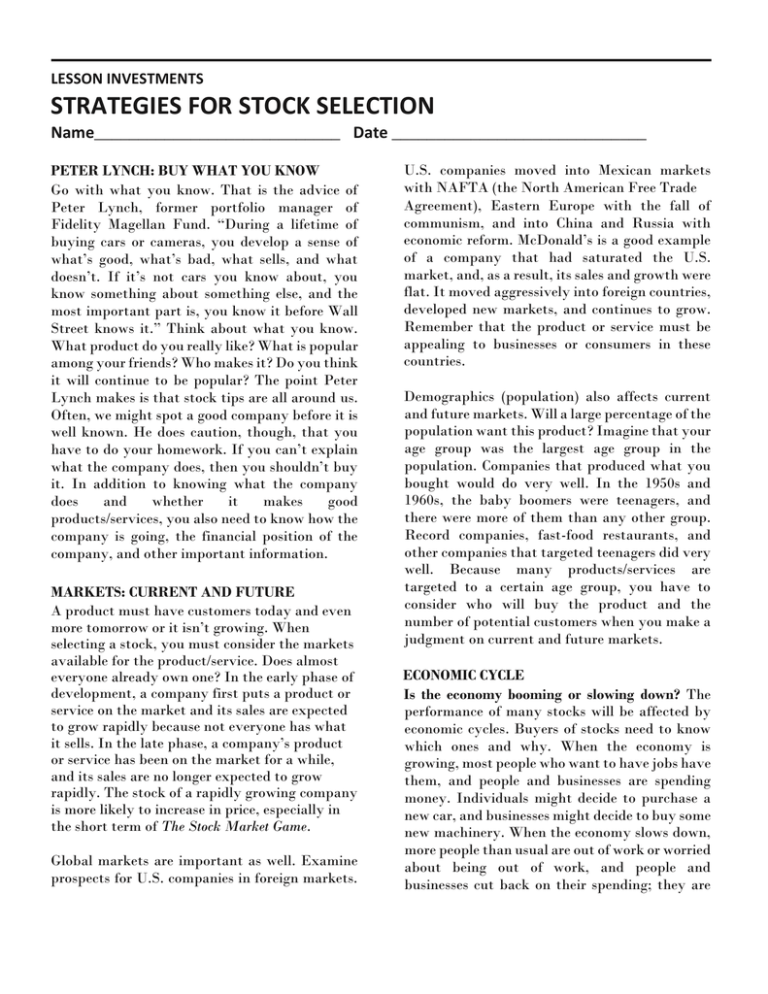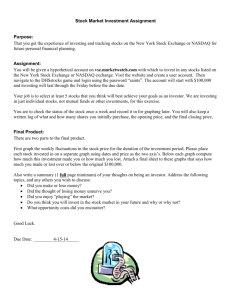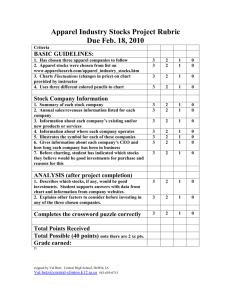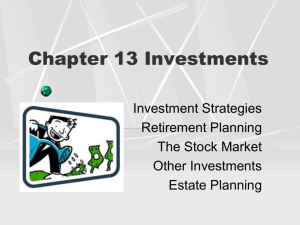File
advertisement

LESSON INVESTMENTS STRATEGIES FOR STOCK SELECTION Name____________________________ Date _____________________________ PETER LYNCH: BUY WHAT YOU KNOW Go with what you know. That is the advice of Peter Lynch, former portfolio manager of Fidelity Magellan Fund. “During a lifetime of buying cars or cameras, you develop a sense of what’s good, what’s bad, what sells, and what doesn’t. If it’s not cars you know about, you know something about something else, and the most important part is, you know it before Wall Street knows it.” Think about what you know. What product do you really like? What is popular among your friends? Who makes it? Do you think it will continue to be popular? The point Peter Lynch makes is that stock tips are all around us. Often, we might spot a good company before it is well known. He does caution, though, that you have to do your homework. If you can’t explain what the company does, then you shouldn’t buy it. In addition to knowing what the company does and whether it makes good products/services, you also need to know how the company is going, the financial position of the company, and other important information. MARKETS: CURRENT AND FUTURE A product must have customers today and even more tomorrow or it isn’t growing. When selecting a stock, you must consider the markets available for the product/service. Does almost everyone already own one? In the early phase of development, a company first puts a product or service on the market and its sales are expected to grow rapidly because not everyone has what it sells. In the late phase, a company’s product or service has been on the market for a while, and its sales are no longer expected to grow rapidly. The stock of a rapidly growing company is more likely to increase in price, especially in the short term of The Stock Market Game. Global markets are important as well. Examine prospects for U.S. companies in foreign markets. U.S. companies moved into Mexican markets with NAFTA (the North American Free Trade Agreement), Eastern Europe with the fall of communism, and into China and Russia with economic reform. McDonald’s is a good example of a company that had saturated the U.S. market, and, as a result, its sales and growth were flat. It moved aggressively into foreign countries, developed new markets, and continues to grow. Remember that the product or service must be appealing to businesses or consumers in these countries. Demographics (population) also affects current and future markets. Will a large percentage of the population want this product? Imagine that your age group was the largest age group in the population. Companies that produced what you bought would do very well. In the 1950s and 1960s, the baby boomers were teenagers, and there were more of them than any other group. Record companies, fast-food restaurants, and other companies that targeted teenagers did very well. Because many products/services are targeted to a certain age group, you have to consider who will buy the product and the number of potential customers when you make a judgment on current and future markets. ECONOMIC CYCLE Is the economy booming or slowing down? The performance of many stocks will be affected by economic cycles. Buyers of stocks need to know which ones and why. When the economy is growing, most people who want to have jobs have them, and people and businesses are spending money. Individuals might decide to purchase a new car, and businesses might decide to buy some new machinery. When the economy slows down, more people than usual are out of work or worried about being out of work, and people and businesses cut back on their spending; they are LESSON INVESTMENTS not likely to spend money on items or services they do not absolutely need. They are not as likely to purchase a new car, build a house, take a trip to Hawaii, or—in the case of a business— build a new plant or buy new equipment. But even in bad economic times, people still buy some products. They brush their teeth, eat cereal for breakfast, take a pill for that awful cold, and heat their homes. They might be a little more careful about expenditures, but some items will be purchased despite the downturn. Understanding the economic cycle helps you make judgments about when to buy which stocks. During recessions, stocks in defensive industries ( medicines, food, clothing, public utilities, etc. ) generally decline less than stocks in other industries. During expansions, defensive stocks often show less growth and return. Companies in cyclical industries (high-priced consumer goods like cars and appliances; raw materials like aluminum, steel, and cement, and tools and equipment) are often highly affected by business cycle conditions. During recessions, stocks in cyclical industries generally decline as much as or more than stocks in defensive industries. During expansions, cyclical stocks offer much higher returns and growth potential. AVOID THE OBVIOUS RISKS Front-page stories and this year’s winners Beware of front-page stories. Of the 20,000 stocks publicly traded, only two or three will be found on page one. This year’s winners are unlikely to be next year’s winners. Most stocks don’t get headlines, and when they do, everyone else knows about it as well, including Wall Street. Stick with the boring stocks. You will have to work a little harder, but your chances of picking a good stock are much better. Current Industry Condition To what industry (group of companies that produce or sell the same kind of product or service) does your potential stock selection belong? Industry classification includes transportation, automotive, food and beverage, retail/apparel, health care, entertainment, communication, utilities, financial, and several others. Will current events in the United States or other nations affect businesses in a specific industry? Is that industry in trouble? For example, when the Clinton administration was developing a plan for government-sponsored health care in 1994, there was speculation that prices would be regulated for some medicines. As a result, the pharmaceutical companies experienced a sharp drop in their stock prices. Merck, a strong company with an excellent record of growth and income, dropped right along with the others. A given company might be a good company, but a given time might not be a good time for its stock. (Merck later recovered.) Changes in Technology You also have to consider whether your selection will be affected by changes in technology. IBM, known as Big Blue, staked its growth on mainframe computers. But growth in personal computers surged, and companies producing personal computers clearly outdistanced IBM. IBM stock recovered later, too, but until it caught up to market technology its prices were affected. Sometimes, the choice isn’t as obvious as it seems. In the music industry, CD players virtually replaced turntable record players. Recently, however, some music lovers have argued that CDs do not last as well as records and do not have the same quality of sound. Many older people have not parted with their records and wish to purchase new record players. IF this were the case, would the market for CD players and record turntables be affected? Would it affect their stock? You bet! Specific Stock Situation Even if the markets, industry, economic cycle, and technology angles all check out, stock buyers still have to check the specific stock situation. If a particular company is in trouble or could be in trouble, then it is not a good choice. For example, although the contact lens industry had been relatively strong and healthy, LESSON INVESTMENTS one of the companies, Bausch and Lomb, experienced significant problems when its management sought an unrealistic growth rate. The impact of this goal on production and distribution resulted in large unsold inventories and eventually a precipitous drop in profit and in the price of a stock. Bausch & Lomb stock would not have been a wise choice at that time. DO YOUR HOMEWORK Once you have a general idea about how your selection fares in each of these categories, it is time to use some common sense and do a little research. You should know what the company does and whether it makes good products/services. How is the company doing? What is the financial position of the company? What is the company debt (assets to liabilities ratio), earnings growth over the past five years, high and low prices for the year (stock tables)? What about dividend payments? Is the company in an early or late phase of development? Are new developments in progress? What other businesses does the company own? Is there diversity in the products it makes? Information can be found by writing to the company for an annual report, by looking at newspaper stock tables, by calling or visiting the business department at your city library, by calling an area broker, etc. The bottom line is that YOU have to do some thinking, some research, some more thinking, and then make a selection. LESSON INVESTMENTS STRATEGIES FOR STOCK SELECTION Name____________________________ Date _____________________________ Questions for Discussion 1. What is Peter Lynch’s advice for picking stocks? 2. Give an example of a stock that you think has a growing market. 3. What is an example of a good stock to buy in a recession? Expansion? 4. Why should you beward of front-page stories? 5. Explain how changes in technology affect stock prices. LESSON INVESTMENTS MATCHING STRATEGIES TO STOCK SELECTIONS Name____________________________ Date _____________________________ For each of the following, read and discuss each statement. Using Strategies for Stock Selection (Activity 1), consider each stock(s) mentioned, then identify and describe the strategy you would use for stock selection. Decide whether you would buy the stock(s) or not. Explain your reasoning. 1. Widget Manufacturing Company has been on the leading edge of technological change. Widget’s sales and profits have been very strong. However, it is currently being sued for patent infringement, and the evidence against it appears strong. STRATEGY: ___________________________________________________________ ___________________________________________________________________________ REASONING:________________________________________________________________ ___________________________________________________________________________ 2. I love my Wonder Walkers. They are the best shoes I have ever worn. My friends all wear them. I’m surprised more people haven’t discovered them, but the company that produces them is small, so their distribution is limited. STRATEGY: ___________________________________________________________ ___________________________________________________________________________ REASONING:________________________________________________________________ ___________________________________________________________________________ 3. The economy is rolling along, and so am I. My friends and I have great jobs, and our futures are looking bright. I think I’ll treat myself to some General Motors stock. STRATEGY: ___________________________________________________________ ___________________________________________________________________________ REASONING:________________________________________________________________ ___________________________________________________________________________ 4. It’s rough out there. The economists say we are in a recession. I still have my job, but a lot of others don’t. I’d better be careful with my stock selections. I think I’ll buy Kellogg’s or Wisconsin Valley Electric Company. Or maybe it would be safer to buy General Motors stock. After all, everybody needs a car—even when times are rough. STRATEGY: ___________________________________________________________ ___________________________________________________________________________ REASONING:________________________________________________________________ ___________________________________________________________________________


